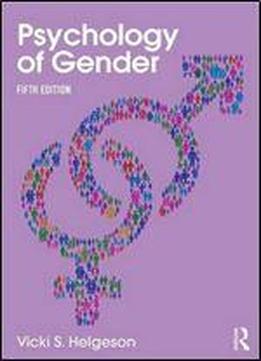
Psychology Of Gender: Fifth Edition
by Vicki S. Helgeson /
2016 / English / PDF
14.7 MB Download
Noted for its fair and equal coverage of men and women, this book reviews the research and issues surrounding gender from multiple perspectives including psychology, sociology, anthropology, and public health, with an emphasis on the interaction between biological and social theories. The implications of social roles, status, and gender-related traits on relationships and health that are central to students' daily lives are emphasized throughout. Students learn how to distinguish the similarities and differences between the sexes and the theories that explain the differences. Methodological flaws that may impact the observance of sex differences are also examined. Learning activities and pedagogical tools included in the text: Do Gender exercises which provide an opportunity to test hypotheses and explore data Sidebars on special interest topics and numerous visuals that bring the studies to life Take Home Points that summarize key concepts in bulleted format Boldfaced key terms and definitions, chapter summaries, discussion questions, and suggested readings which help students review the material New to the 5th Edition: Expanded sections on cohabitation, homosexuality, online relationships, social media influences, single-sex classrooms, sex differences in math abilities, and gender implications of divorce on health Expanded coverage of gender and parenting, gender and the workplace, gender and power, and balancing work and family An expanded intersectional approach that highlights how gender is connected to social class, race, and ethnicity, including more coverage of gender system justification theory Coverage of transgender issues including recent changes in the DSM guidelines Streamlined discussions to further engage students to think about gender issues A companion website at www.routledge.com/cw/Helgeson where instructors will find Power Point slides, multiple choice quizzes, and short answer questions with suggested answers for each chapter and students will find flashcards of key terms, chapter outlines, and links to related websites and further reading Divided into three parts, each section builds on the previous one. First, gender and the development of gender roles across cultures are introduced. Scientific methods used to study gender, attitudes toward gender, and the latest data and theories on sex differences in cognitive, social, and emotional domains are then introduced. Theories of gender-role development, including evolutionary, social learning, social role, and gender schema theories are reviewed along with the implications of gender on achievement. Part one reviews the key information on the similarities and differences between the sexes and the theories that explain the differences which lay the foundation for the remainder of the book. Part two examines the role of gender in relationships including communication styles and the impact of these interactions on friendship and romantic relationships. The third part examines the role of gender on physical and mental health. The effects of marriage and parenting on health are reviewed, including domestic abuse, along with how gender affects the association between work and health. This is an ideal text for upper level gender-focused courses including the psychology of gender, psychology of women or men, gender issues, and gender, womens, or mens studies taught in psychology, womens studies, gender studies, sociology, and anthropology.











